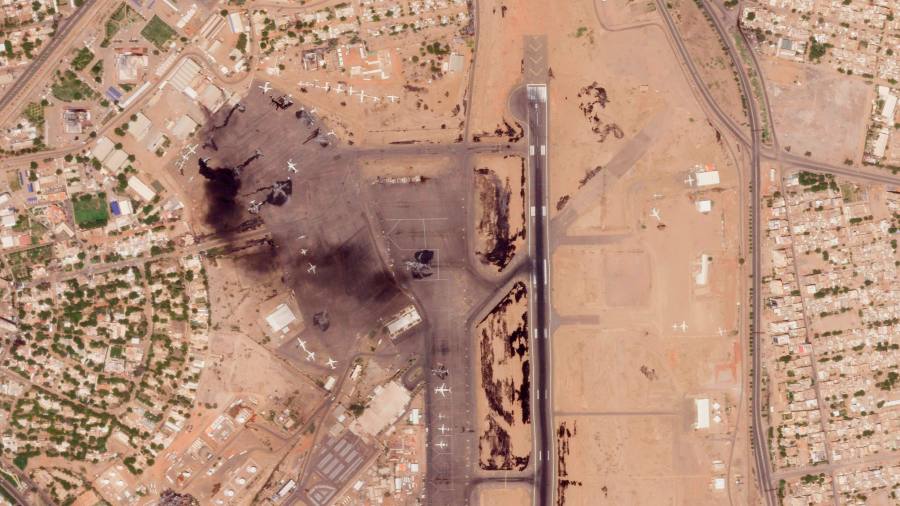A US diplomatic convoy has come under fire in Sudan, as the death toll in the four-day conflict exceeds 180 people and efforts to bring about a ceasefire between the warring sides falter.
Fighting has raged since Saturday between the president-backed Sudanese Armed Forces and the paramilitary Rapid Support Forces loyal to the country’s powerful vice-president, sparking fears of a broader civil conflict.
At least 180 people have been killed and more than 1,800 wounded since the fighting, concentrated in the capital Khartoum, began, according to the UN.
General Mohamed Hamdan Dagalo, the military vice-president better known as Hemeti, said on Tuesday that he spoke with US secretary of state Antony Blinken on the phone and “reaffirmed our unwavering commitment to safeguarding innocent civilians”.
Blinken told reporters in Japan, where he was attending a G7 foreign ministers’ meeting, that “too many civilian lives have already been lost”, adding that a US diplomatic convoy came under fire on Monday. No US personnel were injured in the incident, which appeared to be associated with the Rapid Support Forces, according to Blinken.
“This action was reckless, it was irresponsible and of course unsafe — a diplomatic convoy, with diplomatic plates, a US flag, being fired upon,” he said. Blinken also said he had spoken with Sudan’s de facto military president, General Abdel Fattah al-Burhan.
“We have deep concerns of course about the overall security environment,” said Blinken. “That only underscores the imperative of getting a ceasefire and putting Sudan back on the track that it was on, which was talks and negotiations towards the restoration of a civilian-led government.”
Josep Borrell, the EU’s foreign policy chief, said its ambassador in Sudan had been “assaulted in his own residency” while a non-governmental Sudanese doctors’ committee said that “hospitals in Sudan are under bombardment”.
Volker Perthes, the UN envoy to Sudan who provided the number of deaths and injured, told reporters: “In these current circumstances, under the current conditions, basically no aid delivery can happen.”
As the fighting spreads to other parts of the country, notably the western Darfur region, international and regional pressure to agree a ceasefire has intensified.
The regional IGAD comprising eight countries in the eastern Horn of Africa called for “an immediate cessation of hostilities”. However, the closure of many of Sudan’s airports and the fighting in the capital had impeded in-person mediation efforts by leaders from South Sudan, Kenya and Djibouti.
“The current circumstances don’t allow for their presence,” Burhan told Sky News. “There are still clashes between the factions and the airport is under threat. This is not a suitable climate for them to come.” He added that while he was open to negotiations, his troops would “definitely” defeat Hemeti’s Rapid Support Forces.
The UN’s Perthes said: “The fighting is between two organised military forces. The two sides who are fighting are not giving the impression that they want mediation for a peace between them right away.”
Mehari Taddele Maru, a Horn of Africa analyst, said the ongoing fighting in Sudan had “transcended from a mere power struggle to a fight for survival” for the Rapid Support Forces. He added that the challenges to the armed forces’ “pre-eminence in Sudan’s government and establishment are likely to persist in the future”.
Read the full article here




